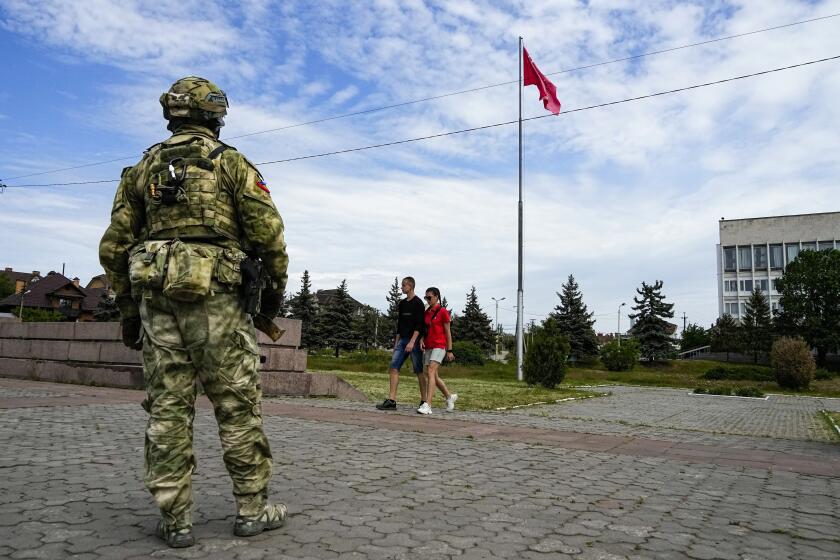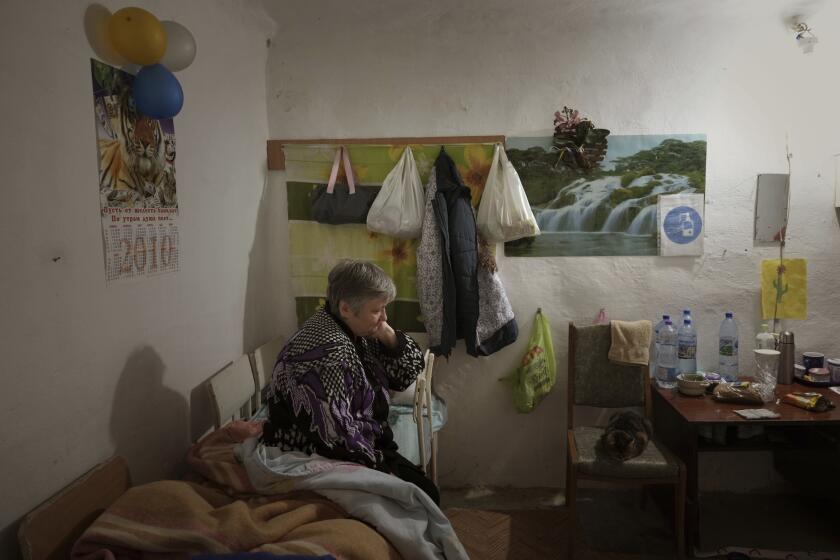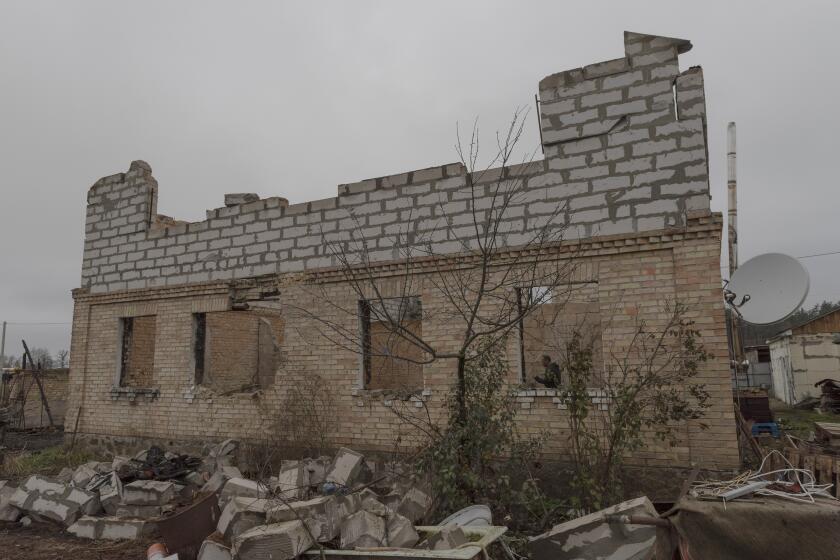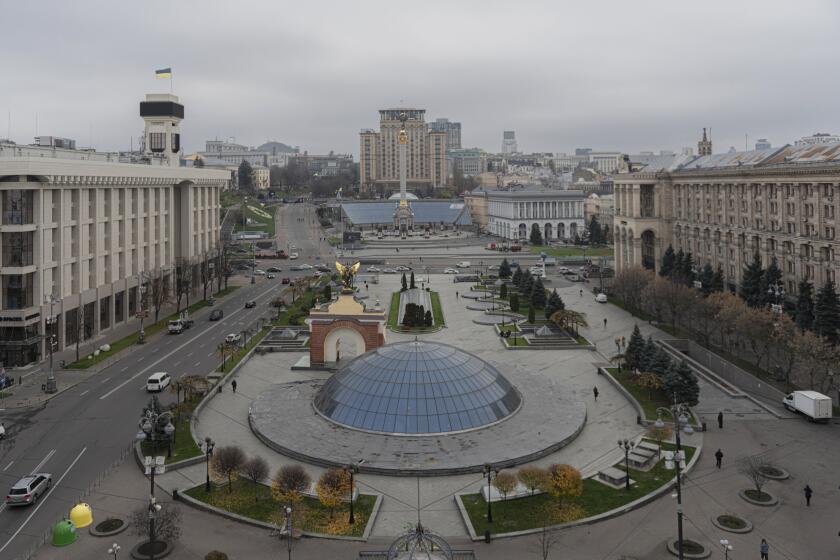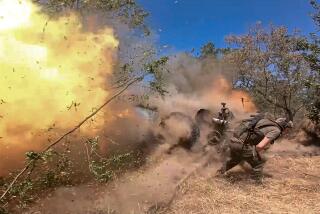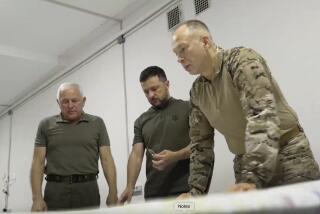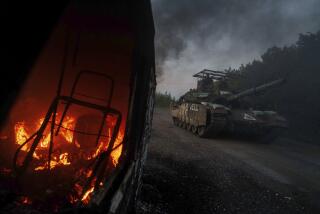Zelensky says Ukrainian special military units are in strategic city of Kherson
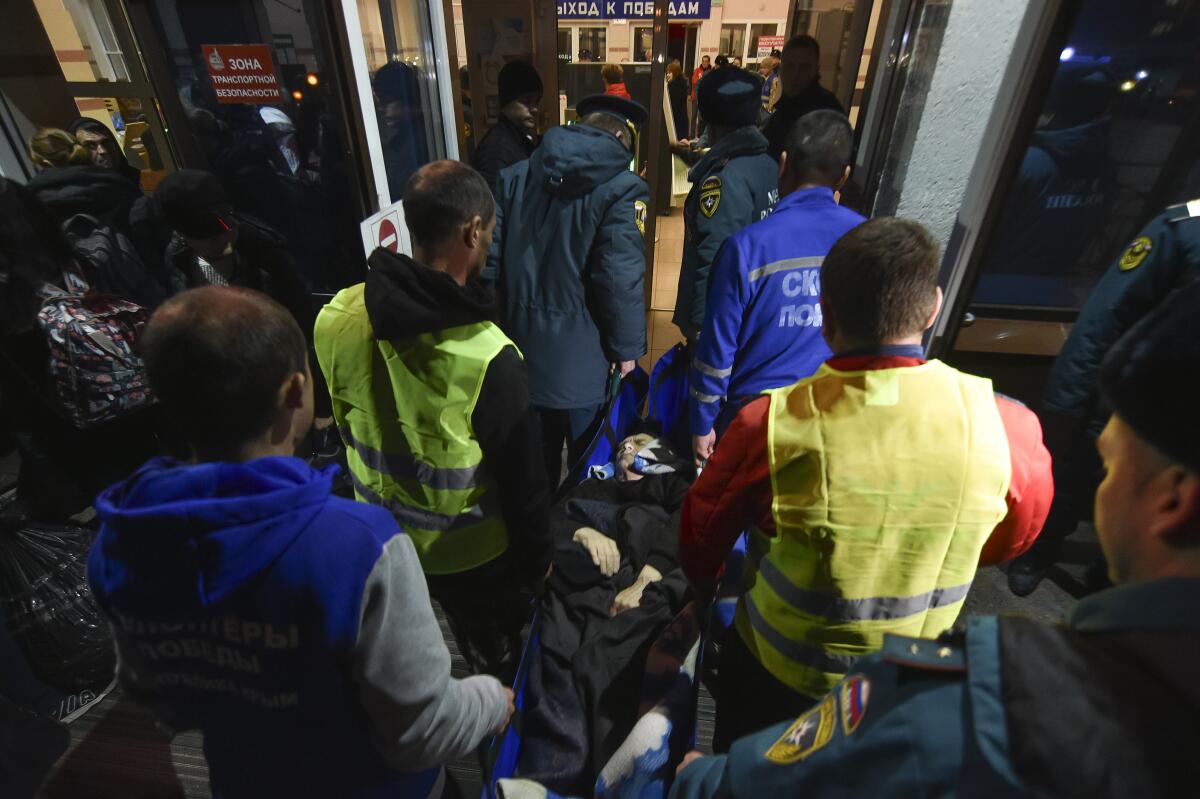
MYKOLAIV, Ukraine — Ukraine’s president said Friday that special military units have entered the city of Kherson.
In a video address hours after Russia said it had completed withdrawing troops from the strategically key city, President Volodymyr Zelensky said: “As of now, our defenders are approaching the city. In quite a bit, we are going to enter. But special units are already in the city.”
Russia relinquished its final foothold in the major city, one of the first to be captured in the war that began Feb. 24. The withdrawal could act as a springboard for farther advances into occupied territory.
Russia’s Defense Ministry said its troops finished withdrawing from the western bank of the river that divides Ukraine’s southern Kherson region at 5 a.m. The area they left included the city of Kherson, the sole provincial capital Russia had captured during its nearly nine-month invasion of Ukraine.
Videos and photos circulating on social media showed residents cheerfully taking to the streets, waving Ukrainian flags and chanting in celebration. A Ukrainian flag flew over a monument in a central Kherson square for the first time since early March, when the city was seized by the Russians. Some video showed crowds cheering on men in military uniform and tossing one man wearing combat fatigues up in the air. Other videos showed villagers embracing troops en route to the city.
Ukrainian officials have not confirmed that the city was back in Ukrainian hands.
Ukrainian forces pressing a counteroffensive in the south have zeroed in on Kherson, a strategic city seized by Russia in the early days of the war.
Zelensky said that Russian forces placed mines in the city and that after troops enter, they will be followed by sappers, rescue workers and energy personnel. Despite the daunting tasks ahead of them, “Medicine, communications, social services are returning. ... Life is returning,” he said.
Ukrainian intelligence urged Russian soldiers who might still be in the city to surrender in anticipation of Ukrainian forces arriving. “Your command left you to the mercy of fate,” it said in a statement. “Your commanders urge you to change into civilian clothes and try to escape from Kherson on your own. Obviously, you won’t be able to.”
A Ukrainian regional official, Sergey Khlan, disputed the Russian Defense Ministry’s claim that the 30,000 retreating troops took all 5,000 pieces of equipment with them, saying “a lot” of hardware got left behind.
The final Russian withdrawal came six weeks after Russian President Vladimir Putin illegally annexed the Kherson region and three other Ukrainian provinces, vowing that they would remain Russian forever. Moscow’s forces still control about 70% of the Kherson region following the pullback, which was ordered amid a Ukrainian counteroffensive.
The Kremlin remained defiant Friday, insisting that the retreat in no way represented an embarrassment for Putin. Moscow continues to view the entire Kherson region as part of Russia, Kremlin spokesman Dmitry Peskov told reporters.
He added that the Kremlin did not regret holding festivities slightly more than a month ago to celebrate the annexation of occupied or partially occupied regions of Ukraine, deferring all questions about the Kherson withdrawal to the Defense Ministry.
Putin has so far been silent about Kherson, despite making several public appearances since the withdrawal was announced.
Shortly before the Russian announcement, Zelensky’s office described the situation in the Kherson region as “difficult.” It reported Russian shelling of some of the villages and towns that Ukrainian forces reclaimed in recent weeks during their counteroffensive in the region.
Many Ukrainians no longer ask if their country will be hit by nuclear weapons — they are actively preparing for that once-unthinkable possibility.
The General Staff of Ukraine’s army said the Russian forces also left looted homes, damaged power lines and mined roads in their wake. Zelensky advisor Mykhailo Podolyak predicted Thursday that the departing Russians would seek to turn Kherson into a “city of death” and would continue to shell it after relocating across the Dnieper River.
Ukrainian officials were wary of the Russian pullback announced this week, fearing that their soldiers could get drawn into an ambush in Kherson city, which had a prewar population of 280,000. Military analysts also had predicted that it would take Russia’s military at least a week to complete the troop withdrawal.
The mayor of Kyiv, Ukraine’s capital, is warning residents they must prepare for the worst this winter if Russia keeps striking energy infrastructure.
Some quarters of the Ukrainian government barely disguised their glee at the pace of the withdrawal.
“The Russian army leaves the battlefields in a triathlon mode: steeplechase, broad jumping, swimming,” Andriy Yermak, a senior presidential advisor, tweeted. Social media videos apparently filmed by soldiers on routes toward Kherson showed villagers hugging the Ukrainian troops.
Recapturing Kherson city could provide Ukraine a strong position from which to expand its southern counteroffensive to other Russian-occupied areas, potentially including Crimea, which Moscow seized in 2014.
From its forces’ new positions on the eastern bank, however, Russia could try to escalate the war, which U.S. assessments say may already have killed or wounded tens of thousands of civilians and hundreds of thousands of soldiers.
Gen. Ben Hodges, former commanding general of U.S. Army forces in Europe, described the retreat from Kherson as a “colossal failure” for Russia, and said he expects Ukrainian commanders will keep pressure on Russia’s depleted forces ahead of a possible future push for Crimea next year.
“It’s too early to be planning the victory parade, for sure. But I would expect by the end of this year — so in the next, let’s say, eight weeks — the Ukrainians are going to be in place to start setting the conditions for the decisive phase of this campaign, which is the liberation of Crimea, which I think will happen by the summer,” he said.
The two countries have been working for some time on the deal, which comes as Ukraine lobbies for more weapons and aid to press its counteroffensive.
Meanwhile, a Russian S-300 missile strike overnight killed seven people in Mykolaiv, a city about 42 miles from Kherson’s regional capital, Zelensky’s office said Friday morning. Rescue crews sifted through the rubble of a five-story residential building in search of survivors.
Standing in front of what used to be his family’s apartment, Roman Mamontov, 16, awaited news of his missing mother. Mamontov said he found “nothing there” when he opened an apartment door to look for his mother after the missile struck. Friday was her 34th birthday, the teenager said.
“My mind was blank at that moment. I thought it could not be true,” he said. “The cake she prepared for the celebration is still there.”
Start your day right
Sign up for Essential California for the L.A. Times biggest news, features and recommendations in your inbox six days a week.
You may occasionally receive promotional content from the Los Angeles Times.
Zelensky called the missile strike “the terrorist state’s cynical response to our successes at the front.”
“Russia does not give up its despicable tactics. And we will not give up our struggle. The occupiers will be held to account for every crime against Ukraine and Ukrainians,” Zelensky said.
The Russian Defense Ministry did not acknowledge striking a residential building in Mykolaiv, saying only that an ammunition depot was destroyed “in the area of the city.”
Mykolaiv Mayor Oleksandr Senkevich told the AP that Russia could step up its shelling of his city. “The more success the Ukrainian army has, Russia lowers its bar of terrorism,” he said.
Senkevich said that S-300 missiles launched from the Kherson region can reach Mykolaiv within one minute. Some 149 civilians have been killed and 700 people wounded in the city since the Feb. 24 start of the war.
Zelensky’s office said Russian drones, rockets and heavy artillery strikes across eight regions killed at least 14 civilians between Thursday morning and Friday morning.
Ukrainian mayors, civilian administrators and nuclear power plant workers say they have been abducted, threatened or beaten by Russian forces.
The state of the key Antonivskiy Bridge linking the western and eastern banks of the Dnieper remained unclear Friday. Russian media reports suggested that the bridge was blown up following the Russian withdrawal.
But Sergei Yeliseyev, a Russian-installed official in the Kherson region, told the Interfax news agency that “the Antonivskiy Bridge hasn’t been blown up — it’s in the same condition.”
Also Friday, Zelensky’s deputy chief of staff, Kyrylo Tymoshenko, said construction has begun on a barrier of concrete posts topped with barbed wire along the border with Belarus. Russia used Belarus as a staging area for troops and weapons when it invaded Ukraine and concerns persist that Belarus’ authoritarian President Alexander Lukashenko may agree to send his troops to Ukraine.
More to Read
Sign up for Essential California
The most important California stories and recommendations in your inbox every morning.
You may occasionally receive promotional content from the Los Angeles Times.
